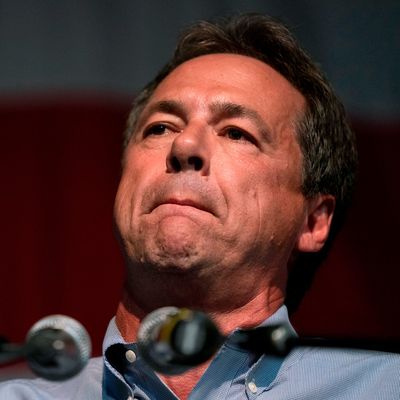
The 2020 Democratic presidential field, which added two candidates (Deval Patrick and Michael Bloomberg) last month, continued its natural “invisible primary” shrinkage as Montana governor Steve Bullock and former representative Joe Sestak withdrew from the race at the end of the Thanksgiving weekend.
Sestak left the contest as he entered it (very late, in June): as more or less an asterisk. He hoped his anti-Establishment persona and strong national-security record (he reached the rank of rear admiral in the Navy) would give him traction. But he raised very little money (under $400,000 in 2019, as of the third quarter), made no real mark in Iowa or other early states, and never threatened to make any debate stage. He came across as a figure from the past, less because of his two unsuccessful Senate campaigns in Pennsylvania than because of seeming like the relic of an era when Democrats pined incessantly for candidates with a military background.
Bullock, a sitting two-term governor from deep-red Montana with a reasonably progressive record, was a different matter. On paper, he had a strong electability argument in a cycle when Democratic voters were obsessed with electability, and as the presidential field first formed, he had some serious street cred. But he fatally alienated many insiders by refusing to enter the contest until his state’s legislative session ended in May. He missed the first debate in June, then had his one shot at a breakout moment in the July 30 debate in Detroit. As my colleague Gabriel Debenedetti explained at the time, expectations for Bullock were high going into that event:
For months now — and, in some cases, years — a handful of senior Democrats have been whispering to donors, activists, strategists, and pundits that they should take a serious look at Montana governor Steve Bullock. Here’s a guy who’s actually won a statewide race deep in Trump Country, an anti-dark-money crusader with a solid liberal record, who could be the non–Joe Biden folksy sorta-centrist voters might be looking for, they said.
Unfortunately, the most memorable Bullock moment in that debate was his argument with Elizabeth Warren about her proposed no-first-use-of-nuclear-weapons position. Appearing determined to keep a preemptive U.S. nuclear strike on the table was not a great look for today’s Democratic Party:
[A]s the evening wound down, his exchange with Warren over nuclear policy highlighted the sheer scale of the task he still has ahead of him. And it reminded his advocates that this world probably isn’t the one of their wistful musings.
And it was John Delaney, not Bullock, who succeeded in hogging attention as the non-Biden-centrist in the race by going after Sanders and Warren repeatedly. That was the last time Bullock appeared in a candidate debate.
He managed to pull in $2.3 million in third-quarter fundraising, enough to run a couple of TV ads in Iowa, the main focus of his campaign. And for his fans there was one thrilling moment when an Emerson poll of that state in October showed him suddenly holding 4 percent of the vote (good for sixth place, ahead of such worthies as Kamala Harris and Cory Booker). But subsequent surveys were deeply discouraging, particularly the gold-standard Selzer poll for the Des Moines Register, CNN, and Mediacom in November, which gave Bullock less than one-half of one percent alongside a pallid
24–26 favorability ratio. Whatever Bullock was selling, Iowa caucusgoers weren’t buying it.
One problem Bullock had among the party insiders who were his strongest constituency was the intense desire many harbored that in the end he would emulate John Hickenlooper by dropping out and instead running for the Senate (in his case, against Republican senator Steve Daines). Like Hickenlooper initially, Bullock has long maintained he’s not interested in becoming a senator, as Vox reported in August:
Bullock has repeatedly — and emphatically — said he doesn’t want the job.
Montana’s Senate seat “has never in his life, not once, been a consideration,” Bullock campaign senior adviser Matt McKenna told Vox. “There’s just no way.”
He repeated that demurral as he withdrew from the presidential contest. Buy cynics–or optimists, depending on how you look at it–will point out that Montana’s filing deadline for the Senate race isn’t until next March. Still, it’s more likely that Bullock will quietly end his term as governor next year and consider his options. He’s relatively young at 53. And if Democrats lose to Trump in 2020, Bullock will still be around, still possessing a sterling political record (if you overlook this misfired presidential bid) and his electability argument as his party sorts through the wreckage and looks for salvation.






























